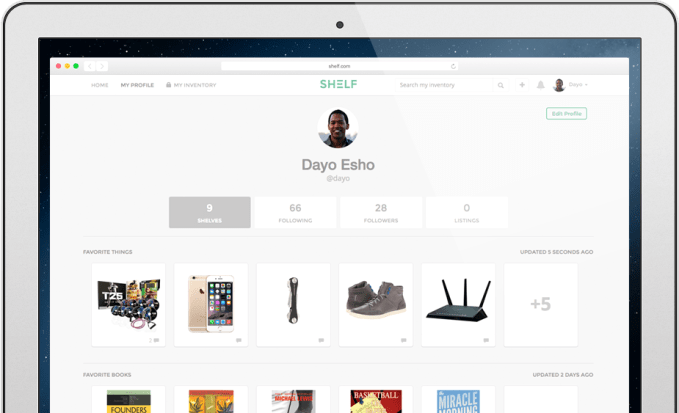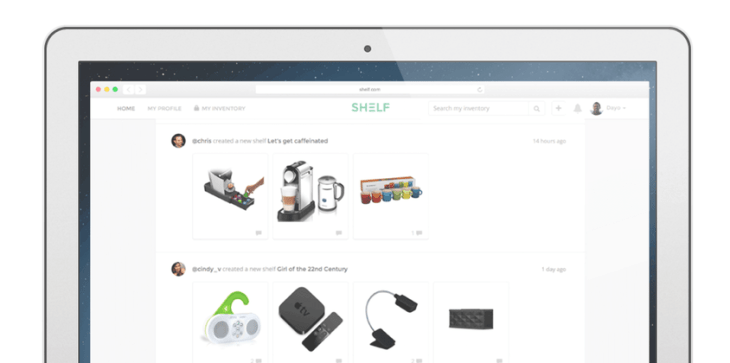A newly launched startup called Shelf wants to make it easier for people to discover great products, without having to first read through tons of online research or consumer reviews. Instead, the company has built a social platform that lets users automatically keep track of their own inventory of purchases, and selectively share this information with friends.
The idea is to bring word-of-mouth recommendations to the web, so you can find out what items the people you trust already own and use. And later, when you’re ready to unload your own items to make room for new ones, Shelf helps automate the selling process, too.
Though Shelf appears to consumers as a simple website for cataloging, sharing, and selling things, the technology behind the site has actually been in development for a couple of years.
The San Francisco-based startup was founded by Dayo Esho (CEO) and Chris Kline (CTO), who worked together for some eight years prior including at Liveramp (which spun out of Rapleaf.) Third co-founder Adriana Diakite (software engineer) has a background which includes Amazon A9, Palantir, Pivotal Labs, and Google.

Originally, Esho tells us, the team was working on a platform focused on helping consumers sell items they already own. But in the process of testing this idea with friends and early adopters, something unexpected happened.
“We started discovering all these products that we hadn’t heard about, and they spawned conversations,” explains Esho. “We were inspired by all these new things we were buying and learning about through our friends, that we wouldn’t have uncovered otherwise. We realized that the grand vision with Shelf is that it could be the smart center for your things,” he says.
At launch, the site offers three main features: the ability to browse and discover products, the ability to optionally track your own items, and the ability to sell those items when the time comes.
What makes Shelf different from the “rate anything” apps that blossomed in years past is that the site focuses on pointing you to your friends’ authenticated purchases.

In order to catalog your inventory, you can either authorize Shelf to scan your email for receipts or you can download a file of your purchases from Amazon, then upload it to the site. (There’s also a way to manually add items, though the team believes that will not be the main way people use the service.)
At launch, Shelf supports receipts from over 50 online stores, including Amazon, Apple, Walmart, Target, Zappos, and all the other top retailers, ranging from big box stores like Office Depot to department stores like Macy’s, and from clothing shops like J. Crew to e-commerce outfits like Wayfair.
Your online inventory is private by default, so you can choose what’s shared. You can also organize the items you share into specific “shelves,” so they’re easier to sort through by friends.
[gallery ids="1269063,1269062,1269061,1269060,1269059"]
The site uses a following model, so you can be more selective about who you choose to friend, and whose recommendations you trust. And when you find a product a friend owns, you can comment directly on the item’s page to begin a conversation.
Where Shelf is more practical – or rather, where it will be in the future – is on the selling side. Today, the site uses the data collected automatically about your item like its name, date of purchase, price paid, and more, in order to pre-fill in the fields on the destination marketplace.
For now, that’s limited to Amazon, but Esho says they’re adding support for Ebay and Craigslist soon.
However, a bit further down the road, Shelf will make selling even more seamless by allowing you to sell without every having to leave Shelf.com itself – it will handle the listing for you. Plus, Shelf will make suggestions about item pricing, based on current market conditions, says Esho.
Shelf is backed by $1.2 million in seed funding led by Google Ventures back in 2014. Additional investors and advisors include 500 Startups (Dave McClure), Auren Hoffman, Nirav Tolia, Scott Banister, Alex Schultz, Maria Thomas, Jeff Epstein, Donna Wells, Brian Roberts, Jason Putorti, Erik Moore, and others.
